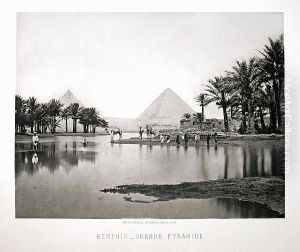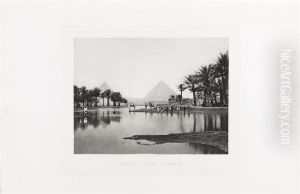Auguste Edouard Mariette Paintings
Auguste Edouard Mariette was a French scholar, archaeologist, and Egyptologist who was instrumental in founding the field of Egyptology and contributing significantly to the understanding of ancient Egyptian history and culture. Born on February 11, 1821, in Boulogne-sur-Mer, France, Mariette was initially trained as a teacher and philologist, developing a strong interest in Egyptian hieroglyphics and archaeology early in his career.
His passion for Egyptology was fueled by his study of the Champollion's works, the French scholar who deciphered the Rosetta Stone. Mariette's career in Egyptology began in earnest in 1850 when he was sent to Egypt by the Louvre Museum to collect Coptic manuscripts. However, he diverted from his original mission upon his arrival, drawn instead to the remains of the ancient civilization.
Mariette is best known for his discovery of the Serapeum at Saqqara, the burial place of the sacred Apis bulls, which he uncovered in 1851. This significant find revealed a treasure trove of information about Egyptian religion and burial practices. Mariette's work went beyond excavation; he also worked tirelessly to protect Egypt's antiquities from looting and destruction. His efforts led to the creation of the Service des Antiquités de l'Égypte, an organization responsible for the conservation and management of Egyptian monuments and artifacts.
In 1858, Mariette was appointed as the first director of the Service des Antiquités, a position he held until his death. Under his leadership, the organization established regulations for excavations, cataloged artifacts, and began the work of systematically exploring and conserving Egypt's archaeological sites. Mariette's dedication to the preservation of Egyptian antiquities also led to the foundation of the Bulaq Museum, which later became the Egyptian Museum in Cairo, an institution that houses the world's largest collection of Pharaonic artifacts.
Throughout his career, Mariette published extensively on his findings and on Egyptian archaeology more broadly. His works contributed greatly to the knowledge and appreciation of ancient Egyptian civilization. Auguste Edouard Mariette passed away on January 19, 1881, in Cairo, Egypt, but his legacy continues to shape the field of Egyptology and the preservation of Egypt's ancient heritage.

